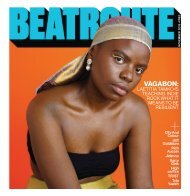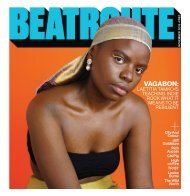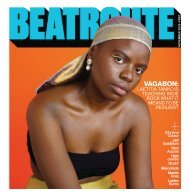BeatRoute Magazine [AB] print e-edition - [March 2018]
BeatRoute Magazine is a monthly arts and entertainment paper with a predominant focus on music – local, independent or otherwise. The paper started in June 2004 and continues to provide a healthy dose of perversity while exercising rock ‘n’ roll ethics.
BeatRoute Magazine is a monthly arts and entertainment paper with a predominant focus on music – local, independent or otherwise. The paper started in June 2004 and continues to provide a healthy dose of perversity while exercising rock ‘n’ roll ethics.
Create successful ePaper yourself
Turn your PDF publications into a flip-book with our unique Google optimized e-Paper software.
Essaie Pas<br />
New Path<br />
DFA<br />
Cinematic is certainly an overused adjective when it comes to<br />
music, but it’s near-impossible to avoid when describing Essaie<br />
Pas. The taut marathon of severe synth bludgeoning that made<br />
their previous release, Demain est une autre nuit (“tomorrow<br />
is another night,” 2016), so delightful was that it was partly<br />
indebted to musical innovations made in film scores like Blade<br />
Runner and giallo flicks.<br />
The Montreal duo’s return to DFA with New Path retains<br />
tradition while being aptly named: the dystopian coldwave of<br />
the release still sounds hand-hewn and ruthless, but adopts<br />
a slicker varnish that helps make the menacing medicine go<br />
down. Every sound on the record feels richer, from the fuller<br />
bass to the higher-fidelity synths.<br />
Lead single “Complet brouillé” recalls co-founder Marie Davidson’s<br />
“Naive to the Bone” in its cheekiness, yet has a robust<br />
tonality more suitable for a mega-rave than a sketchy DIY club.<br />
Once that track completes the deliberately-sequenced A-side,<br />
the distinct back half opens with perhaps the duo’s best track<br />
to date, “Les agents des stups.” Its seven-minute tension flex<br />
doubles the power of Demain’s most chaotic muscles, adding<br />
nuance with multi-tracking and dynamism in its passages.<br />
The tactile feel of this record sells the listening experience<br />
on its own, but keener listeners may want to head to Genius or<br />
Google Translate to explore the sometimes French-language,<br />
sometimes just plain inscrutable lyrics. According to promotional<br />
materials, the subject matter is (fittingly) inspired by<br />
Philip K. Dick’s A Scanner Darkly, and there are field recording<br />
passages that may take some careful listening to contextualize<br />
properly. But don’t be afraid of a little extra work: sometimes<br />
the best thing a record can do is hook you with its veneer<br />
and implore you to find your own way into the underlying<br />
complexities.<br />
• Colin Gallant<br />
48 | MARCH <strong>2018</strong> • BEATROUTE<br />
Nap Eyes<br />
I’m Bad Now<br />
Paradise Of Bachelors/You’ve Changed Records<br />
Haligonian quartet Nap Eyes are what you would get if you<br />
put Blue Rodeo, the Velvet Underground and a handful of<br />
university professors in a studio together to write songs. Led by<br />
Nigel Chapman, the Nova Scotian band has made a name for<br />
themselves by releasing two stellar albums of Maritime slacker<br />
rock chock full of twangy Canadiana. I’m Bad Now, their third<br />
full-length (and final album in an informal trilogy), expands on<br />
their previous releases while sounding more clear-headed and<br />
full of purpose.<br />
Like on much of the album, early highlight “I’m Bad” is a<br />
Wilco-esque, alt-country dirge that finds Chapman seemingly<br />
singing in second-person, examining inward while floating<br />
above. The song features guitarist Brad Lougheed’s most feedback-laden<br />
solo as a hard-earned climax.<br />
Elsewhere, “Follow Me Down” sounds like a Rankin Family<br />
waltz with a whole lot more weed smoke overtop. It also<br />
features some of Chapman’s finest lyrics as he sing-speaks, “I<br />
went out walking with my headphones on/Classical Indian<br />
raga twenty minutes long/Then I listened to old American folk<br />
song/A little bit shorter, still a lot going on.”<br />
Here, and for just about all the album, Chapman writes<br />
whip smart lyrics that are impenetrable to a fault. Still, with a<br />
little investigation, these songs reveal themselves in time. It’s a<br />
testament to the band that even if they didn’t, Chapman’s still<br />
managed to churn out hooks like, “I can’t tell what’s worse, the<br />
meaninglessness or the negative meaning/I figured out a way<br />
to get on with my life and to keep on dreaming” as he does on<br />
the lead single “Everytime The Feeling.”<br />
• Jamie McNamara<br />
Young Fathers<br />
Cocoa Sugar<br />
Ninja Tune<br />
Young Fathers defy typical genre placement. The Edinburgh<br />
trio is most frequently described as an experimental hip-hop<br />
group, but most vocals are sung, not rapped. The buzzing bassheavy<br />
808s lean heavily on early trip-hop. Prominent organs<br />
along with member Alloysious Massaquoi’s hymn-like crooning<br />
lend their brightest moments a gospel shine. African music,<br />
R&B and soul also lend ingredients to the stew that make up<br />
Massaquoi’s, “G” Hastings’ and Kayus Bankole’s music.<br />
Cocoa Sugar is the band’s third album. It is very much a continued<br />
evolution of their previous work, with songs that can<br />
shift from grimy lo-fi hip-hop verses into soaring harmonized<br />
vocals backed by shimmering instrumentation while exploring<br />
religious, moral and philosophical qualms.<br />
The greatest addition to Young Fathers’ sound is the embrace<br />
of vocal effects to broaden the group’s already extremely<br />
expansive range. On “Toy” all three member’s voices warble in<br />
unison in the bridge before the chorus kicks back in for a final<br />
time with desperate howls dominating the background. “Wire”<br />
pitches up Massaquoi’s voice, contrasting greatly with the ringing<br />
bassline that chugs along, dominating the rest of the track.<br />
These tracks embrace Young Fathers grimier side, while “In<br />
My View,” “Lord” and closer “Picking You” lean into their soul<br />
tendencies that often prove to be the band’s most affecting.<br />
“You’ll never find your way to heaven/but you can follow<br />
me” the group chants on that final track. Where they’re going<br />
is never defined, but Cocoa Sugar provides ample proof that<br />
we should follow.<br />
• Cole Parker


![BeatRoute Magazine [AB] print e-edition - [March 2018]](https://img.yumpu.com/59988136/48/500x640/beatroute-magazine-ab-print-e-edition-march-2018.jpg)















